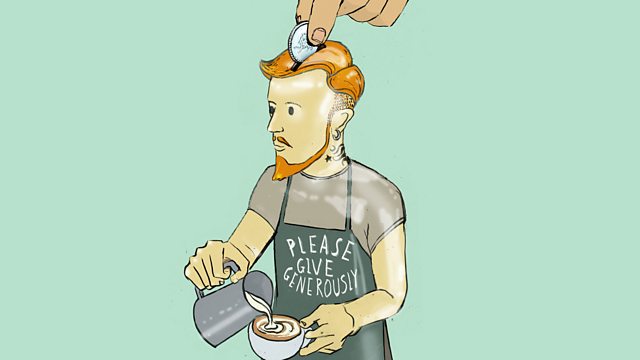Solidarity
With the economic crisis coming in the wake of the pandemic Aleks asks if crowd funding is the magic bullet to give to those whose livelihoods have suffered.
The digital world has given us the tools to support one another through the coming financial crisis in the wake of the pandemic. Aleks Krotoski asks if crowd funding is a magic bullet for giving to those whose livelihoods have suffered?
And what makes us give in the first place if it鈥檚, as many are reporting, a new form of economic survivor guilt do we risk that being manipulated?
Producer: Peter McManus
Last on
Clip
-
![]()
When Guilt Tripping Backfires
Duration: 04:30
Rachel Ho

A Londoner from Adelaide, Rachel Ho runs Craving Coffee (with her partner Matt); a mum, musician on hiatus, accidental feminist and intentional humanist. She tells us about keeping her business going through the pandemic and how crowd funding has allowed them to stay open.
Dr Joe Cox

Dr Joe Cox is Canada聽Research Chair in Digital Disruption and Organisational Transformation at Athabasca University in Canada.聽
He has an extensive track record of research in the digital economy, focusing on emergent digital phenomena such as crowdfunding, crowdsourcing and citizen science.聽 Dr Cox is interested in understanding the ways in which technology impacts upon established economic behaviours, particularly when traditional interactions take place in online environments.聽
His research makes use of innovative approaches to collect and analyse data in order to explore the motivations, behaviours and outcomes of participants in the digital economy.聽 His body of published work offers considerable insight to commercial and policy decision making in digital and online contexts.
He explains the underlying mechanisms of crowdfunding and how visibility can predict a funders behaviour.
Arthur Gautier

His research focuses on philanthropy and more broadly on private initiatives for the common good, from organizational, sociological, psychological and historical perspectives. He studies the emergence and the institutionalization of individual and corporate philanthropy, both as concepts and practices. He is also interested in hybrid philanthropic practices combining multiple institutional logics, such as impact investing, crowdfunding, and foundation-owned companies.
He discusses the different motivations of people contributing to crowd funding projects, the importance of reciprocity and how guilt can sometimes make us give.
Erin Smith

Dr. Erin Smith is an Associate Professor of Disaster and Emergency Response in the School of Medical and Health Sciences at Edith Cowan University in Australia. World renowned for her expertise in first responder mental health and well-being, Dr. Smith is a member of the Board of Directors of the World Association of Disaster and Emergency Medicine (WADEM) where she also holds the position of Convenor of the Psychosocial Special Interest Group.聽
Erin is an emergency response volunteer with Red Cross Emergency Services Victoria and The Code 9 Foundation.
Shamani Joshi

Shamani Joshi is a 22-year-old writer and journalist based in India, currently working with VICE. She focuses on reaching out to Gen Z and Millennial audiences covering topics ranging from politics, human rights, rave culture, niche profiles and bizarre angles.聽
She enjoys binge-watching true crime documentaries, kicking back with ASMR videos and making deep house playlists. She likes her humour like her coffee: dark.聽
With lockdown in India imminent Shamani left Mumbai for the safety of her family home in Goa. While there she began to feel ever more guilty as she saw the hardship others were having to endure. She explain to us how it affected her and what she did with those feelings.
Jennifer Herdt

Jennifer Herdt is an ethicist, whose work ranges across issues in religious and philosophical ethics, with a focus on dignity, character, ethical formation, and the virtues.聽 She is Professor of Christian Ethics at the Yale University Divinity School.
She explains to us how guilt work as an emotion of self-assessment and it differs from shame as it can urge us to do something about what we've done or failed to do.聽
Mehreen Kasana

Mehreen Kasana is a journalist based in Los Angeles, California. She currently covers tech, politics, and culture at Input Mag. She previously worked at The Huffington Post and The Nation.
She tells about an incident of online guilt tripping gone wrong. When AirBnB invited former guests to donate to the hosts whose properties they'd stayed in they couldn鈥檛 have expected the backlash they would receive on social media. People took to twitter to express their anger at being asked to support people who've had a negative impact on the property market and accelerated unwelcome gentrification.
Broadcast
- Mon 12 Oct 2020 16:30大象传媒 Radio 4
Podcast
-
![]()
The Digital Human
Aleks Krotoski explores the digital world



